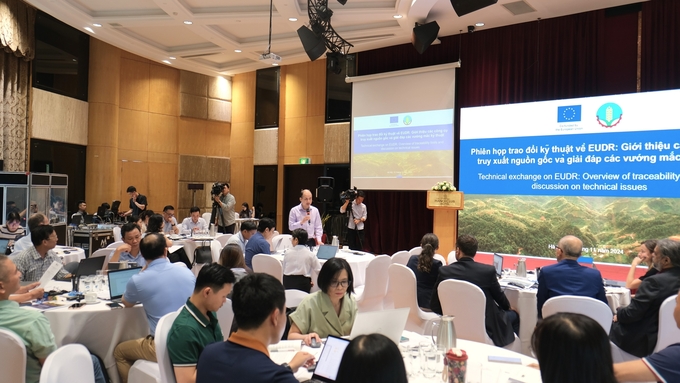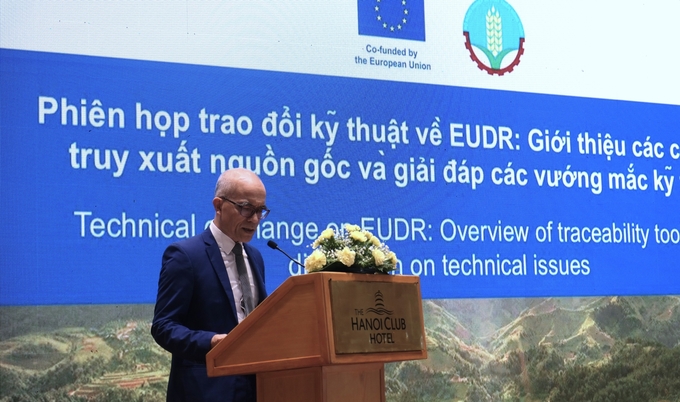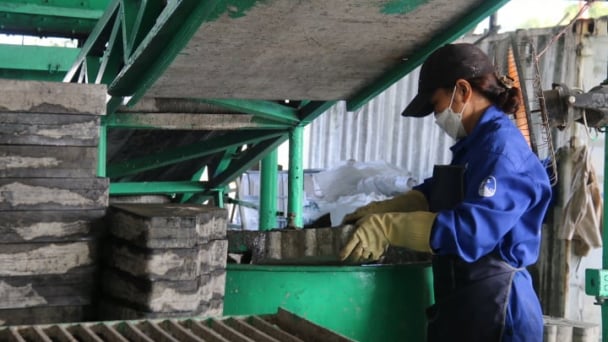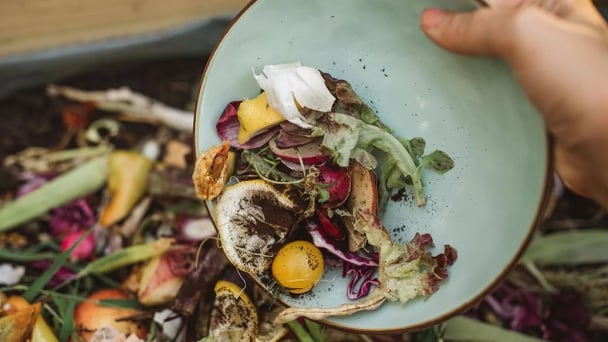May 19, 2025 | 02:04 GMT +7
May 19, 2025 | 02:04 GMT +7
Hotline: 0913.378.918
May 19, 2025 | 02:04 GMT +7
Hotline: 0913.378.918

Overview of the Seminar on "Technical Exchange on EUDR and Deforestation-Free, Forest-Degradation-Free Value Chains".
On November 15, the EU Delegation in Vietnam, in collaboration with the Ministry of Agriculture and Rural Development (MARD), organized the seminar "Technical Exchange on EUDR and Deforestation-Free, Forest-Degradation-Free Value Chains."
The event aimed to clarify the new EU guidelines, address questions from stakeholders, and discuss traceability tools in the supply chain in Vietnam.
The seminar attracted over 200 delegates from government agencies, private businesses, and associations in sectors like timber, rubber, coffee, and non-governmental organizations.
The European Union Deforestation Regulation (EUDR) was enacted to prohibit the import of products and goods linked to deforestation and forest degradation, effective from December 31, 2020. Key sectors in Vietnam, including coffee, rubber, wood, and wood products, are among those impacted by this regulation.
This regulation is part of a broader strategy to reduce greenhouse gas emissions, protect biodiversity, and promote transparent, sustainable global supply chains.

Mr. To Viet Chau, Deputy Director of the Department of International Cooperation, emphasized that Vietnam has not delayed its preparation and adaptation to the EUDR requirements.
Speaking at the seminar, Mr To Viet Chau affirmed: "Vietnam has not waited but has proactively met the requirements of the EUDR. This proactive approach demonstrates our determination to build a sustainable, transparent supply chain that does not contribute to deforestation, strengthening Vietnam's position as a responsible agricultural supplier in the international market."
On the EU Delegation's side, Dr Rui Ludovino praised Vietnam's pioneering role: "Compared to other countries, Vietnam and its related businesses have made the best preparations, thanks to the active support from the Ministry of Agriculture and Rural Development, industry associations, and the businesses themselves".

Dr Rui Ludovino, a representative of the EU Delegation to Vietnam, praised Vietnam's pioneering role.
Dr. Ludovino noted that Vietnam needs to continue implementing the steps it has already taken, especially focusing on collecting data from farms such as geographical indications and packaging standards.
Initially set to apply in December 2024, the regulation has now been postponed to December 2025 for large enterprises and June 2026 for small and medium-sized enterprises.
The EUDR aims not only to protect forests but also to serve as a tool for reducing greenhouse gas emissions and promoting the achievement of sustainable development goals. With mandatory requirements like traceability and accountability, the EUDR provides an opportunity for Vietnamese businesses to enhance standards and improve their competitiveness in international markets.
At the same time, the EU is committed to continuing its support for Vietnam through technical tools, information, and dialogue, helping businesses seize the opportunities from the EUDR.
With this close cooperation, Vietnam hopes not only to meet the EU's requirements but also to contribute to the global fight against deforestation and forest degradation.
Translated by Hoang Duy

(VAN) Deputy Minister Nguyen Quoc Tri also expressed his hope that Cuba will soon overcome its current challenges, attain food security, and further expand cooperation with Vietnam.

(VAN) The project contributes to enhancing the resilience of communities vulnerable to the impacts of climate change, with a primary focus on local women.

(VAN) Green materials help save energy and resources. However, after more than 10 years, Vietnam has only developed over 200 green buildings with more than 6 million square meters of floor space.

(VAN) Vietnam - Thailand Business Forum 2025: One plus one on three connects, marking a milestone in the comprehensive strategic partnership between the two nations.

(VAN) The United Nations designated 22 May as the International Day for Biodiversity 2025 with the theme 'Harmony with nature and sustainable development.'
![Multi-channel, multi-directional Vietnamese agricultural markets: [8] A national strategy is needed](https://t.ex-cdn.com/nongnghiepmoitruong.vn/608w/files/phucpm/2025/05/15/1435-thi-truong-nong-san-viet-da-kenh-da-huongbai-8-can-mot-chien-luoc-quoc-gia-084750_728.jpg)
(VAN) The Chairman of Hung Nhon Group shared: ‘Opening up and tapping into new markets is the right and strategic direction for Vietnam's agricultural sector.’

(VAN) Food waste has become a serious issue in modern society, especially in rapidly urbanizing and developing cities like Hanoi.